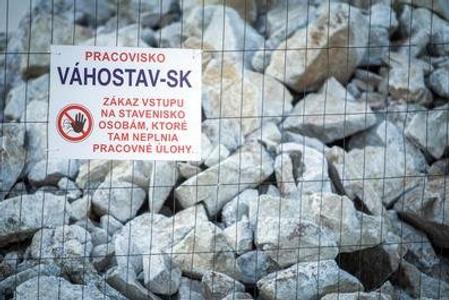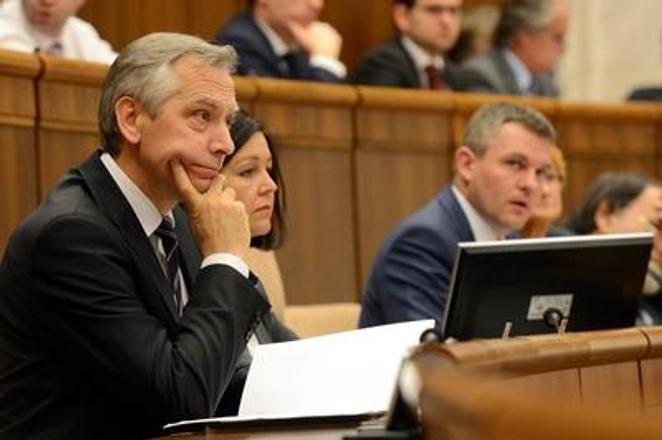CONTRARY to the cases of construction companies TSS Grade or Doprastav that underwent restructuring, the case of Váhostav-SK has grown into a nationwide affair.
While Prime Minister Robert Fico first distanced himself from the case, he and his cabinet later prepared a measure to help small and medium-sized companies to whom Váhostav-SK plans to pay out only 15 percent of their debt. As he sees especially cheap highway construction orders behind troubles of Váhostav-SK he has called on Ján Figeľ who served as a transport minister during the time many of the contracts were closed, to take political responsibility and resign from his post of the deputy speaker of parliament.
Figeľ, Christian Democratic Movement (KDH) chairman, refuses to resign responding that he only respected the law. “If somebody should leave from the political-economic playground, these are misters Fico and Široký,” said Figeľ, as cited by the TASR newswire.
The Fico cabinet responded with a proposal to dismiss Figeľ with which parliament started to deal immediately during a special session, starting April 15, which also included a no-confidence motion against Health Minister Viliam Čislák and revisions to legislation related to bankruptcy and restructuring instigated by Váhostav-SK.

As of press time parliament had not decided about Figeľ while opposition parties warned that if parliament, which is dominated by the ruling Smer party, dismisses Figeľ, they will withdraw their people from all parliamentary posts.
Fico’s accusations
Fico labels Figeľ as the person responsible for the current problems of small and medium-sized companies to whom Váhostav-SK owes millions of euros. He stressed at a press conference on April 14 that most contracts between small and medium-sized companies as sub-contractors and Váhostav-SK were signed between 2010 and 2012 when Figeľ served as the transport minister as part of the Iveta Radičová cabinet. Figeľ, according to Fico, pushed on highway construction prices to decrease to show that he can build highways for lower costs.
The prime minister recalled that apart from harming creditors there is also a suspicion of fraud and that the police have already started investigation. He also delivered to the General Prosecutor’s Office an analysis confirming that badly set contracts were behind most claims, which are now part of the restructuring.
Fico also indicated that a criminal offence of fraud might have been committed.
“We continue to be convinced that there is also a suspicion of a criminal offence of fraud because managers had to know that they would be not able to pay, but I will leave this to prosecutors and police,” Fico said as cited by TASR.
Speaking at a press conference on April 14, Figeľ stressed that Fico – together with Juraj Široký, who is involved with Váhostav-SK and an alleged Smer sponsor – can dismiss him, but they won’t be able to shut him up.
“They can’t shut [my mouth] because of truthful testimony,” said Figeľ, adding that it is Fico and Široký, instead who should leave the political-economic arena.
Figeľ rejects Fico’s claims that he, as a former transport minister, artificially drove down prices for highway construction as part of a marketing stunt, which allegedly caused the current Váhostav-SK crisis.
“That’s ridiculous, false and untrue,” said Figeľ. “I didn’t force anyone but respected the law. It was the era of fair and transparent tenders, with the tenders’ results in line with the European state of affairs.”
On the other hand, opposition parties ascribe the blame for the Váhostav-SK affair to Fico and his government.
“The ruling Smer party played ball in fraudulent behaviour of not only this company [Váhostav-SK] but also other companies in such a way that it is taking a toll on the self-employed and small businesses,” said Figeľ.
According to Figeľ, Smer has been sitting idly by, letting those powerful decide and act. Had Smer wanted, said Figeľ, it could have backed several bills tabled by opposition parties that came to grips with the sort of problems faced now by small businesses on the back of Váhostav-SK ’s restructuring – a process that Figeľ went on to call scandalous and unfair.
Underpriced orders
In 2010 Figeľ cancelled the so-called first package of the public–private partnership (PPP) project, launched during Fico’s first term, to build and operate five D1 highway stretches with total length of 75 km. Váhostav-SK and Doprastav were members of the winning consortium, while construction costs were €2.4 billion. All three packages of PPP highway construction projects, of which only one materialised, were considered too expensive. After its cancellation, the first-package of the project was divided into individual stretches, for which new tenders were announced, some of which Váhostav-SK won, as a member of consortiums, for prices below what experts had estimated it would cost.
In June 2011, a consortium of Váhostav-SK and Bögl a Krýsl, signed with the National Highway Company a contract to build the first 9 km part of the 18.5 km stretch Jánovce – Jablonov close to Levoča for almost €60 million without VAT while expert estimate was almost €95 million, the SITA newswire reported at that time.
In October 2011 Váhostav-SK signed a contract to construct the 16.4-km highway stretch Dubná Skala – Turany for €137.75 million without VAT, which was just 41.15 percent of the originally estimated cost of €334.72 million.
In both cases Váhostav-SK claimed that the prices were realistic. While in regards to the first order Ján Kato, the then general director of Váhostav-SK said that “the price is maintainable, but it does not provide opportunities for development of the company and responds to the situation on the market”, he said in case of the second order that “the price is final; changes are possible only in reasoned cases”.
In November 2013, the consortium Čebrať whose members are Váhostav-SK and Czech company OHL ŽS signed a contract to construct the 15.3 km Hubová – Ivachnová stretch of road for €227.26 million without VAT, 48.8 percent of the expert estimate of €465.71 million, SITA wrote.
Other companies, apart from Váhostav-SK also Doprastav and Eurovia, won highway tenders for prices below those calculated by experts with some admitting that some of the projects might be loss-making for them. This way they wanted to keep employment and technologies afloat during years when the financial and economic crisis hit Slovakia and wait for better times.
Another explanation of lower prices than expert estimates was that during Radičová’s term a new system of procurement started to be used, the Denník N daily recalled. Within it, the construction company can itself design technologies for the construction and reduce the price this way.
Lower than expert estimated prices by which construction companies win highway tenders have also occurred during Fico’s term. For example, the Dúha company in consortium with Italian Salini Impreglio offered to build the 13.5 km stretch of the D1 highway including an 8-km tunnel for €409.8 million or 45.5 percent of the expected price of €899 million.


 Ján Figeľ, head of KDH (source: TASR)
Ján Figeľ, head of KDH (source: TASR)